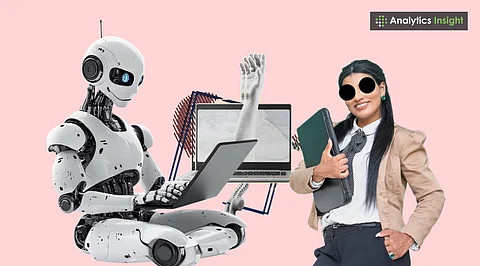

AI automates repetitive, data-heavy tasks, increasing efficiency and accuracy across industries, reducing the need for human intervention in routine roles.
Jobs requiring creativity, critical thinking, and emotional intelligence remain less vulnerable, highlighting the importance of uniquely human skills in the future workforce.
Workers must upskill and adapt to collaborating with AI technologies to thrive in a rapidly evolving job market driven by automation.
Artificial intelligence (AI) and the innovations it drives are having a profound impact on the labor market. Routine tasks such as rapid data processing, data management, and other repetitive activities are increasingly being automated, leading to the gradual disappearance of specific job profiles.
As a result, industries across various sectors are transforming to enhance efficiency, with AI assuming roles that require neither creativity nor complex decision-making. Understanding which jobs AI is likely to replace is essential for preparing both individuals and organizations to adapt to the evolving workforce shaped by AI technologies.
Discussions about AI replacing jobs have intensified as automation reshapes traditional roles. AI is transforming the workforce by automating tasks across various roles. Here are eight jobs or industries where Artificial Intelligence increasingly replaces repetitive, data-driven, and routine creative work.
By achieving accuracy and speed in conversion, AI has transformed translation from a cumbersome and tedious affair into a smooth conveyor belt. In many common instances involving common languages, AI job replacement enables instant text or voice translation, requiring much less human effort in business, travel, and customer service; however, complex translations still need human intervention.
AI-powered content generators churn out articles, reports, and marketing copy while requiring fewer human interactions. They help human writers draft routine content; however, stories that demand nuance, emotional depth, and original ingenuity remain human writers' purview.
Repetitive telemarketer calls and customer interaction scripting are the best candidates for AI. By utilizing voice assistants and chatbots to enhance conversation-level outreach with a personal touch, efficiency increases, and costs decrease. This transformation reduces the need for human telemarketers, whose working method is based on scripted standard dialogue.
Nowadays, manufacturing heavily relies on AI-enabled robots to work on assembly lines, conduct quality checks, and perform the final packaging processes. These machines work faster and more precisely than humans and prefer to work endlessly without fatigue. The result is that fewer and fewer manual labor jobs are available in factories, primarily for mundane, routine tasks.
Also Read: How AI Helps Fill Healthcare Talent Gaps: Will It Replace Jobs?
AI-based algorithms combine massive datasets to find trends, forecast markets, and make investment suggestions. These automated systems now carry out risk assessments, report production, and other tasks that normal analysts would perform, which lessens the need for routine financial analysis by human analysts.
Repetitive and time-consuming manual input and verification tasks have been significantly reduced or eliminated through AI automation and optical character recognition (OCR) tools. These tools can also enhance accuracy and speed, thereby replacing manual data entry jobs in various sectors, including healthcare, finance, and logistics.
Artificial Intelligence has reshaped retailing with self-checkout kiosks, inventory management, and customer support through chatbots. Reduced dependence on cashiers, stock clerks, or customer-serving frontline staff streamlines the operation, improving customer experience without human intervention.
AI design tools automatically generate templates, logos, and simple visuals based on user input. These tools assist and accelerate workflow but contribute to jobs at risk for Artificial Intelligence, especially entry-level design roles focused on routine tasks. However, complex and creative design work still requires human creativity.
Also Read: Aravind Srinivas Predicts Perplexity AI's Comet Browser May Replace Two Jobs
Artificial Intelligence is reshaping the socio-economic arena by marvelously automating highly repetitive, data-heavy, and mundane tasks, usually faster and more accurately than any human.
While some jobs AI will replace, new roles emerge that require creativity, critical thinking, and emotional intelligence, areas where humans excel. Adapting to this evolving future means workers must upskill and learn to collaborate with AI technologies, driving innovation and productivity.
Q1. What types of jobs are most at risk from AI automation?
Jobs involving repetitive, data-heavy, or routine tasks, such as data entry, telemarketing, and basic manufacturing roles, are most vulnerable. Creative, strategic, and emotionally intelligent roles remain safer from full automation.
Q2. Can AI completely replace creative jobs like writing and graphic design?
AI can automate routine and template-based creative tasks but struggles with deep creativity, emotional nuance, and originality. Human creativity remains essential for storytelling, complex design, and innovative content creation.
Q3. How can workers prepare for jobs AI will replace?
Workers should upskill by learning AI-related technologies, develop creativity, critical thinking, and emotional intelligence. Embracing lifelong learning and adaptability ensures they can collaborate effectively with AI systems.
Q4. Will AI create new job opportunities despite replacing some roles
Yes. While AI replaces routine jobs, it also creates new roles in AI management, development, data analysis, and creative problem-solving. The future workforce will require new skills to work alongside AI technologies.
Q5. Is AI job replacement a threat to all industries equally?
No. Industries with high levels of routine tasks, like manufacturing, retail, and basic data processing, face greater risk. Sectors requiring human judgment, creativity, and interpersonal skills are less impacted by AI automation.
